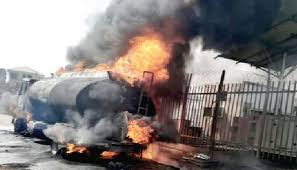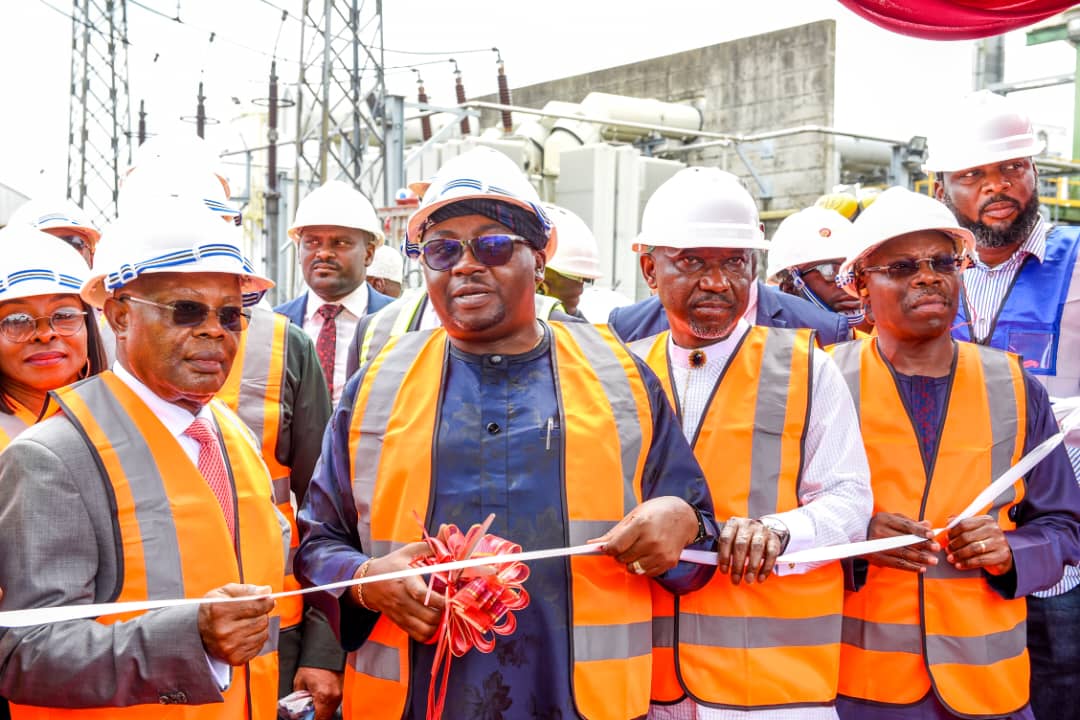City Crime
10 Reasons Why Anti-Corruption War Is Not Succeeding
City Crime
NEMA warns against scooping of fuel from accidented tankers

The National Emergency Management Agency (NEMA) has warned against the practice of scooping fuel from accidented tankers, noting it has led to the loss of many lives and property.
The agency’s Head of Operations in Ibadan, Mr Kadiri Olanrewaju, cautioned during a sensitisation programme on tanker fire accidents, held on Wednesday at Akinyele Local Government Area (LGA) of Ibadan.
The News Agency of Nigeria (NAN) reports that the programme was held in collaboration with the Oyo State Emergency Management Agency (OYSEMA) in Akinyele LGA and other stakeholders.
Olanrewaju said Akinyele LGA was selected for the awareness campaign because of its strategic location as a trailer route from the northern to the southern part of the country.
“These agencies felt that it was necessary to bring this important message to critical stakeholders in communities under the Akinyele LGA, where we have major trailer parks.
“The campaign kick-started in Ogun; we will soon move to Osun.
“The focus is to drive strong sensitisation against the scooping of fuel at the grassroots level, especially for local governments along the trailer routes to reduce needless loss of lives and property,” he said.
He charged the Federal Road Safety Corps (FRSC) and other relevant agencies to enforce the laws against underage driving and ensure the proper certification and retraining of drivers.
The Administrative Secretary of OYSEMA, Mrs Ojuolape Busari, said that Community Development Associations (CDAs) were involved in the campaign to reach a larger number of people.
Busari noted that people still scoop fuel from accidented tankers because there had not been any serious punishment attached to the offence.
She, therefore, called for stiff penalties for anyone caught perpetrating the act.
“Apart from the risk of fire outbreak that may occur during the practice, it is stealing, which is a serious offence,” she said.
Earlier, the Executive Chairman of Akinyele LGA, Hon. Akinwole Akinyele, suggested that fuel transportation should be handled through the rail system, while leaving tankers for intra-city fuel transportation.
The chairman called for an urgent review of laws and policies related to fire services and road safety to meet the urgent and modern demands.
He said that the implementation of stricter fuel transportation regulations, vehicle maintenance, drivers’ training and retraining, and safer fuel handling practices remained crucial to the fuel distribution system in Nigeria.
“The attendant costs of tanker fire accidents have been huge, both in terms of the high number of fatalities and the loss or destruction of property, environmental damage, and public infrastructure,” he said.
NAN reports that the event featured technical sessions, lectures, and presentations from the FRSC, Nigeria Security and Civil Defence Corps (NSCDC), Fire Service, traditional and market leaders, among others.
City Crime
Democracy Day: Tinubu Addresses Joint N’Assembly Today

…To Confer National Honours On Select Lawmakers
President Bola Ahmed Tinubu will deliver a presidential address before a joint session of the National Assembly today as part of events marking Nigeria’s Democracy Day celebration.
The event is scheduled to be held in the House of Representatives chamber of the National Assembly Complex, Abuja.
This was confirmed in a statement released on Sunday by the spokesperson of the House of Representatives, Hon. Akin Rotimi.
The statement referenced an internal memorandum issued by the Clerk of the House, Yahaya Danzaria, officially notifying lawmakers of the proceedings.
According to the memorandum, the special joint sitting will begin at 11:00 a.m. with preliminary activities before the arrival of President Tinubu, who is expected at noon.
Democracy Day is observed annually on June 12 in remembrance of the 1993 presidential election, widely regarded as Nigeria’s most credible poll since independence.
The election was won by Chief Moshood Kashimawo Abiola but was annulled by the military government led by General Ibrahim Babangida (retd).
The theme for the 2025 celebration is “26 Years of Democracy: Renewing Our Commitment to National Development.”
President Tinubu is attending the event as the Special Guest of Honour and is expected to use the platform to reflect on the state of Nigeria’s democracy and present his administration’s vision for the future.
The session will also feature goodwill messages from former presiding officers of the National Assembly.
Meanwhile, the President will confer national honours on select legislators in what organisers describe as part of efforts to recognise contributions to democratic governance.
The National Assembly views the event as an important marker of Nigeria’s political evolution.“This joint sitting represents a significant moment in Nigeria’s democratic journey,” the statement read.
“It underscores the pivotal role of the National Assembly in safeguarding democratic values, fostering accountability, and advancing national development over the past 26 years of uninterrupted civil rule.”
Lawmakers also used the occasion to urge Nigerians to reflect on the country’s democratic progress and to renew their commitment to national unity and inclusive governance.
“The House of Representatives calls on all Nigerians to embrace the spirit of Democracy Day as a time for reflection, renewed patriotism, and commitment to building a more inclusive, prosperous, and united nation,” the statement said.
Meanwhile, the Federal Government has declared today as a public holiday, to commemorate this year’s Democracy Day celebration held every June 12.
June 12 was officially designated as Nigeria’s Democracy Day in 2018, to honour the annulled 1993 presidential election, widely considered the freest and fairest in the nation’s history and won by Chief MKO Abiola.
In a statement announcing the holiday, the Minister of Interior, Dr Olubunmi Tunji-Ojo, on behalf of the Federal Government, congratulated citizens on the occasion of 26 years of uninterrupted democratic rule in the country.
“June 12 represents our historic journey to building a nation where truth and justice reign, and peace is sustained and our future assured,” Tunji-Ojo stated.
City Crime
Rivers Women Celebrate Fubara’s Second Year Anniversary With Thanksgiving

Rivers women, under the aegis of Rivers Women Unite for SIM, have celebrated the second year anniversary of the suspended Governor of Rivers State, Sir Siminalayi Fubara, with praise and thanksgiving.
The women, who gathered at the Ecumenical Centre, Port Harcourt, last Thursday, said that no matter the prevailing circumstances in the State, Fubara has shown great capacity in leadership and deserves to be celebrated.
They emphasised that their gathering was to thank God for what He has done through Fubara and the expected restoration and peace within the State.
They commended Rivers people and all Nigerians who have been standing by the Governor and Rivers people all through these trying times, saying it is now time for peace, reconciliation and restoration.
Speaking on behalf of the women, Dr. Queen Idanyingi Karibi Botoye, said the women have been consistently praying for the State and its leaders.
She urged the leaders of the State to put their differences behind and think about the people first and come together to advance the interest of the State.
The women assured that their prayers will continue until God restores the glory of the State and ensures greater harmony amongst its leaders and people.

